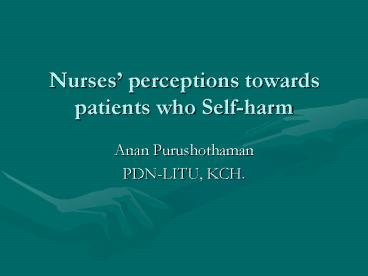Nurses perceptions towards patients who Selfharm - PowerPoint PPT Presentation
1 / 22
Title:
Nurses perceptions towards patients who Selfharm
Description:
Ethics committee approval. Informed consent with ongoing option to withdraw ... Ongoing assessment of supportive services for nursing staff, patients and families ... – PowerPoint PPT presentation
Number of Views:33
Avg rating:3.0/5.0
Title: Nurses perceptions towards patients who Selfharm
1
Nurses perceptions towards patients who Self-harm
- Anan Purushothaman
- PDN-LITU, KCH.
2
UK Aetiology of Acute Liver Failure
2
3
(No Transcript)
4
KCH-LITU
- Admissions due to POD
5
Background
- 25,000-30,000 hospital admissions in England
each year gt1300 deaths per year ( Morgan et al,
2005) - The annual direct cost of hospitalization with
POD is approximately 8 million
6
Paracetamol Hepatotoxicity
- At therapeutic levels lt 4 g paracetamol is
considered to be one of the safest drugs on the
market - Marked liver necrosis can occur with as little as
7.5-10 g - Fatalities are rare with less than 15 g
- The highest mortality seen at doses gt48g
(OGrady, 2006)
6
7
Metabolism of Paracetamol Within Therapeutic
Ranges
- 1) 85-90 metabolised 2) 5-10 metabolised by
cytochrome - By the liver P450 (CYP) system
- By direct sulfation (30) N-acetyl-P-benzoquinon
e imine - And glucuronidation (55) (NAPQI)
- Pathway
- 5 unchanged
- Excreted in urine
- Deactivation by Glutathione
7
8
Clinical Phases of Paracetamol Overdose
- Phase I - 6 hours post ingestion
- Nausea, stomach pains, vomiting and sweating
- Phase II - next 24-48 hours
- AST, ALT, Bilirubin and PT show a steady decline
in liver function - Phase III - 2-5 days post ingestion
- Overt hepatic damage becomes evident
8
9
Timing of Complications
Renal Failure
INR
Encephalopathy
72
120
Time Post Overdose (hrs)
10
Reasons for research Major public
health problem despite legislationIncrease
admissions to LITU No formal training on
self-harm in clinical environment No
psychiatric input within the liver care
groupLack of research on liver nurses attitudes
11
How?
- Qualitative methodology to yield rich meaningful
data(Parahoo, 2006) - Ethics committee approval
- Informed consent with ongoing option to withdraw
- Purposeful sample of nurses from LITU and liver
wards - Interviews conducted via a semi-structured
approach - Tape recorded and transcribed verbatim
- Thematic analysis performed
- Data analysed and implications for practice
identified
12
Emerging themes
- Reasons for POD
- Roles in caring
- Competence incompetence in caring
- Positive Negative attitudes in caring
13
Reasons for POD
- Cheap and easy to buy
- No limit how much you can buy
- Back ground h/o mental health problems
- Not able to adapt to the changes in society
- People from lower socio-economic background
- Not aware of the consequences of POD
- A cry for help
14
Roles in caring
- Communication is essential-talking and listening
empathetically. - Develop a rapport to help them
- Need to be empathetic and provide emotional
support for patients and their families
15
Competence in caring
- I am competent enough to care for these types of
patients. We are already specialised nurses we
dont need any extra training-RN-10 - I think the bereavement and dying study day
prepared me adequately to deal with the family. I
can cope very well and I am very good in dealing
with the families RN 2
16
Incompetence in caring
- No formal education and training on psychological
support and counselling - Lack of time- busy shortage of staff
- Lack of empathy
17
Positive attitudes
- Treat them equally
- Need to help them
- staff who has positive attitude, they can make
so much difference in their lives- (RN-9)
18
Negative attitudes
- I feel they should not be transplanted as it is
a waste of an organ, efforts and moneyso on.
That organ will be better off for someone else. - Hard work, frustrating, demanding difficult
19
Implications for practice
- Poor staffing levels and insufficient time have
been highlighted as possible reasons for negative
attitudes towards this client group.
20
Implications for practice-contd
- An urgent need to offer training on inter
personnel communication skills and counselling - The nurse training curriculum may also need to
include substance misuse/POD as one of the main
areas of study - Encourage nurse-led research in to this area
- An observational study on liver nurses attitudes
21
Implications for practice-contd
- To investigate patients perceptions of their
nursing care - CPD to address the negative attitudes
- Action learning - reflective practice
22
Implications for practice-contd
- Guidelines of communication between patients,
families and existing services - Mass education to the public about the dangers of
paracetamol - Ongoing assessment of supportive services for
nursing staff, patients and families































